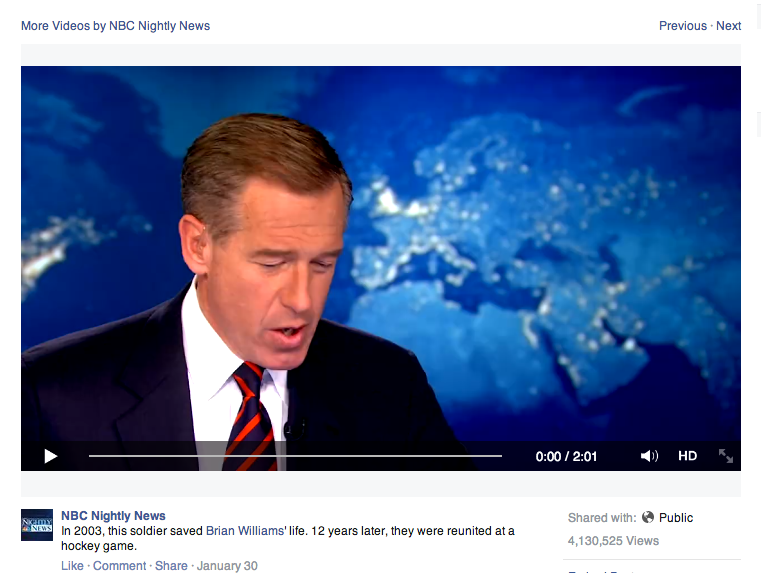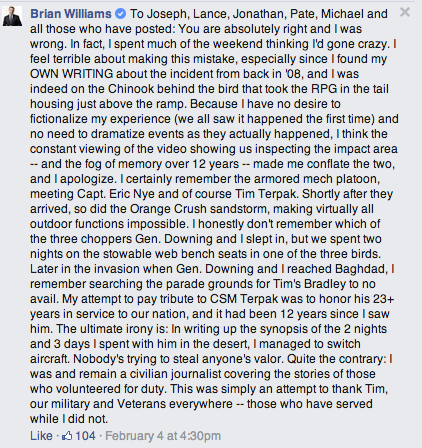He’s an award-winning journalist with a broadcasting career spanning over 30 years. He was the anchor of the most popular evening news show, which received almost 10 million viewers nightly. He appeared on late-night talk shows and was a guest on shows like “Saturday Night Live.” He previously ranked 23rd on a list of most trusted people in America.
On the February 4th broadcast of “NBC Nightly News,” anchor and managing editor Brian Williams began a media and public firestorm that would begin to question his journalistic integrity. That night, he issued an on-air apology and recanted part of a story he had told incorrectly throughout the years beginning when he was reporting in Iraq in 2003. Williams recanted his story after several soldiers there and the military newspaper, Stars and Stripes, challenged the story’s validity.
In late January, “NBC Nightly News” filmed Brian Williams and U.S. Army Command Sergeant Major Tim Terpak at a New York Rangers game. The public address announcer told the crowd that the soldier “was responsible for the safety of Brian Williams and his NBC News team after their Chinook helicopter was hit and crippled by enemy fire.” The soldier, Tim Terpak, served as ground security for the helicopters that landed.

In his response to NBC’s Facebook post, Lance Reynolds expressed his skepticism. On January 31st, he commented: “Sorry dude, I don’t remember you being on my aircraft. I do remember you walking up about an hour after we had landed to ask me what had happened.”

Lance Reynolds was the flight engineer on the helicopter that was hit by RPG fire. Reynolds and other crew members told Stars and Stripes that Mr. Williams was not in their helicopter. In truth, Mr. Williams was in the helicopter that arrived an hour after the other three helicopters had already made an emergency landing.
On February 4th, Brian Williams replied to the Facebook comment, saying that Reynolds was “absolutely right” and he, indeed, made a mistake. He wrote that “the constant viewing of the video showing us inspecting the impact area — and the fog of memory over 12 years — made me conflate the two, and I apologize.”

Later that day, he apologized again. This time, it was on television. “This was a bungled attempt by me to thank one special veteran and by extension our brave military men and women veterans everywhere, those who have served while I did not” he said. “I hope they know they have my greatest respect and also now my apology.”
According to David Carr, a former New York Times reporter, it was a “weak, confused apology.” He added, “A full-throated, unmodulated apology is the only thing that will satisfy a public who placed their trust in him.”
Former CNN journalist and University of Maryland Professor Mark Feldstein contended on CNN Newsroom, “You know, truth matters. Trust matters…when it comes right down to it, people watch the news to get information, as well as entertainment. And if you can’t trust the person who’s delivering the news, there’s a price to be paid for it.”
Two days after the on-air apology, it was confirmed that NBC would begin an internal investigation into Brian Williams’s claims led by Richard Esposito. Members of the inquiry will not only investigate the murky details of Brian Williams’ Iraq incident but also any other stories being called into question, including reporting on Hurricane Katrina in 2005.
During the disaster, Mr. Williams stayed at the Ritz-Carleton in the French Quarter. Mr. Williams described scenes of graphic detail and had riveting stories of the perils he encountered. During Katrina, he claimed that the Ritz-Carleton was “overrun” by gangs. Further, he stated that he saw a corpse float past his hotel in the flood water. He also said he got dysentery, a disease that causes the inflammation of the intestines. While he was at the hotel, Williams decided against having an IV and later, he “had no medicine, nothing.”
But that’s not what happened, according to Myra DeGersdorff, who was the hotel manager at the time. To prepare for the storm, she did everything she could think of, from enlisting local cops as security to sealing exits with mattresses to setting up a “MASH unit” filled with medicines and operated by many doctors. She recalled that there were looters in the French Quarter, but she “wouldn’t say they were gangs.” She said that one time, looters did try to go inside the hotel, and they breached a door. However, they were quickly chased out. Ms. DeGersdorff also mentioned that there was a possibility that Williams could have seen a body, but she doesn’t believe it was in the French Quarter because it only received inches of flood water.
Brian Williams recalled a vastly different story, as told by American author and Rice University Professor Douglas Brinkley. Brinkley wrote in his book The Great Deluge that “armed gangs had broken into the 527-room hotel, brandishing guns and terrorizing guests. Williams, in fact, had seen his first corpse floating down Canal Street from his eighth-floor window earlier that day. Then fever consumed him.”
A day after the investigation began, Brian Williams announced that he was taking a temporary leave from his show due to becoming “too much a part of the news.” A week later, it was announced that Williams had been suspended for six months without pay; even though, in December, Mr. Williams signed a $10 million contract for five years. On February 11, NBC altered the name of the broadcast from “NBC Nightly News with Brian Williams” to “NBC Nightly News.”
But, others see the situation as a place to forgive Williams’s mistake, including David Brooks. New York Times Op-Ed columnist David Brooks said, “I do think we’d all be better off if we reacted to these sorts of scandals in a different way. The civic fabric would be stronger if, instead of trying to sever relationships with those who have done wrong, we tried to repair them, if we tried forgiveness instead of exiling.”
Mark Joseph Williams disagreed with this stance that Brian Williams’s “transgressions were not a fundamental part of his primary responsibilities.” Instead, Mark Williams wrote, “The truth is that reporting the news truthfully is the No. 1 job responsibility for Mr. Williams. All else pales.”
Under the facade of fame, media integrity can disappear, especially when considering the high pressures and high stakes for journalists. Mr. Williams’s recent incident highlights the need to hold the media accountable for their actions as well as the need for preventing such trends from occurring in the future. It is important to remember Brian Williams is certainly not the only respected reporter to claim false information surrounding Iraq or any other event. While acknowledging the mistakes of the reporters we have placed our faith and trust in and the difficulties of their job, we must answer consider journalistic integrity and the importance of accuracy, coupled with the consequences of forgiving or not forgiving false claims of information in the media.